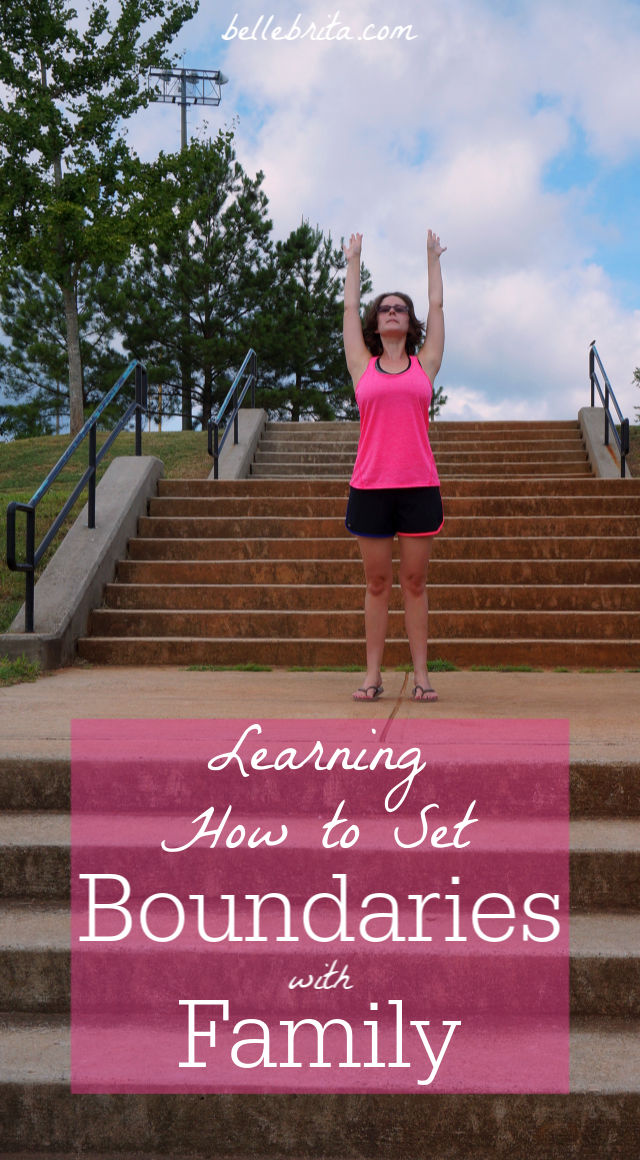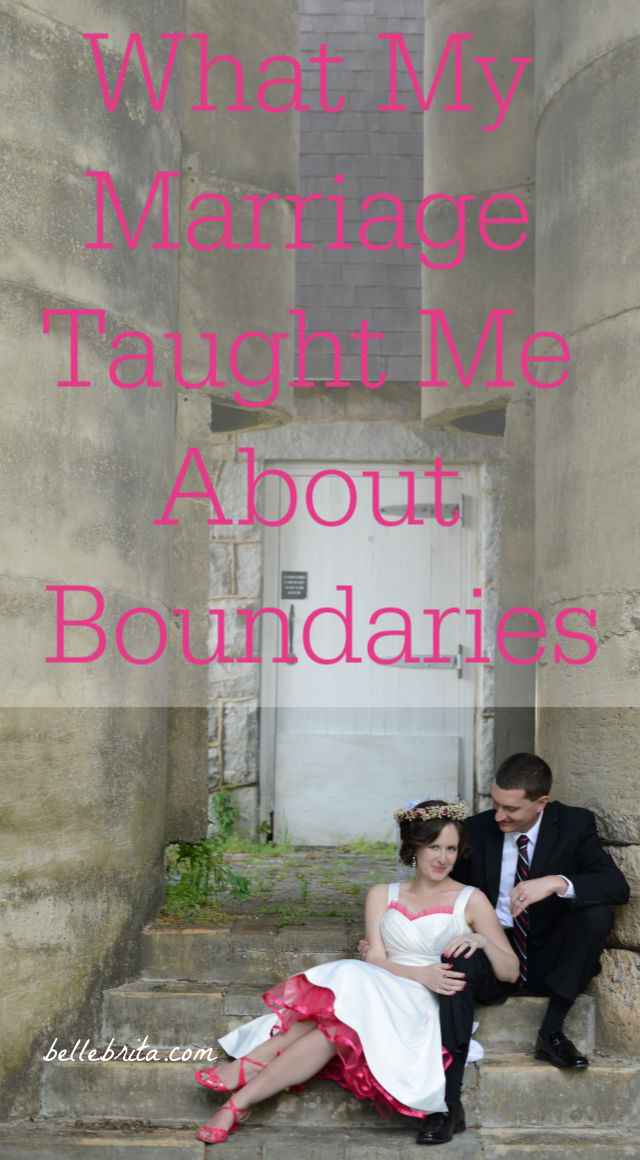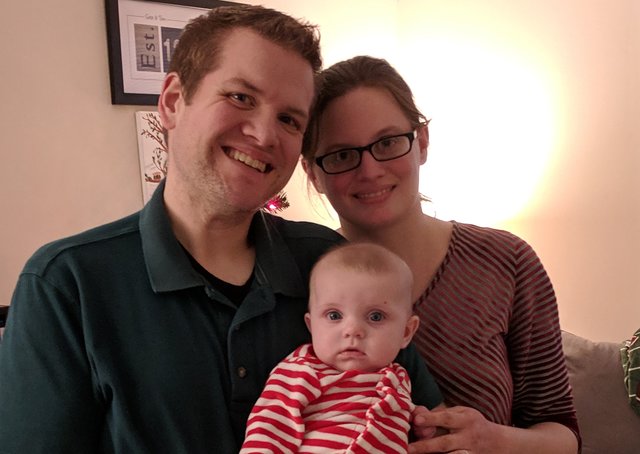Warning: Undefined array key "pagesize" in /home/belleb8/public_html/wp-content/plugins/inlinkz-scripter/InLinkz_scripter.php on line 43
Warning: Undefined array key "noentry" in /home/belleb8/public_html/wp-content/plugins/inlinkz-scripter/InLinkz_scripter.php on line 48
Welcome to the seventh day of the 2019 Love Blog Challenge! Today’s prompt is Boundaries. Check out the announcement post for all the prompts and rules this month. You can still join the link-up for Friday’s topic, Vulnerability.
There’s a reason I keep bringing Boundaries back as a prompt for the Love Blog Challenge. It’s a popular topic. Some readers want reassurance that their boundaries are okay. Others need guidance on setting boundaries. And at least a few share my feminist indignation at boundaries that disproportionately screw over women.
Setting boundaries can be a challenge. Setting boundaries with your family can be a BIG challenge. Even writing about setting boundaries with family makes me nervous.
But this is a topic that I’ve wanted to cover for some time now. I even mentioned in a previous post that one of my boundaries as a blogger is waiting months or years to blog about a personal topic. I do this to protect the guilty parties. While they might still recognize their own actions in my writing, the passage of time muddles their identity from most mutual acquaintances.
This is still a hard post to write.

People don’t like it when you start setting firm boundaries with them. They lose their power over you when you set and keep a firm boundary.
People also don’t like it when you set firm boundaries with mutual friends or family. This often upsets the group dynamic. It’s usually easier to paint you as the villain for having a boundary rather than acknowledging someone else crosses boundaries.
I’m just guessing on this last one, but people probably don’t like it when you blog about your boundaries. They don’t like seeing carefully composed words pointing out entirely reasonable boundaries. This is especially true if their lives would be so much easier if you would just roll over and accept verbal abuse like you previously did for years.
Setting Boundaries with Family
I didn’t realize I had such poor boundaries with certain members of my extended family until Dan and I became serious. A few things happened shortly before our engagement, during our engagement, and during the first year of our marriage. These all gave me clarity on the importance of setting boundaries with family. And that’s not just true for my side of the family, but Dan’s side of the family too.
What My Marriage Taught Me About Boundaries with Family
Note: These are all real examples of interactions with my extended family and Dan’s extended family. I’m not mentioning age, gender, or the type of relative. None of these identifying details are necessary to understand the interactions with relatives.
I was at dinner one night when a relative made snarky remarks about Dan. Dan wasn’t at the table during this moment. I defended him. The relative went past snarkiness to cruelty. This relative only backed down when other family members finally spoke up (which they should have done sooner).
During our engagement, a relative said some incredibly malicious things about my decision to marry Dan. This relative refused to apologize.
These two incidents opened my eyes. In both cases, I demanded respect for my husband and respect for our marriage. I was not willing to continue a relationship with any relative who would be cruel about my husband or our marriage. This came naturally to me, without even thinking about it.
And yet I started to realize that I didn’t always stand up for myself in the same way. I didn’t demand respect for myself.
Since then, I’ve been drawing boundaries. I can’t always completely cut someone out of my life, but I can vastly limit our interactions.
Some of My Boundaries
These are just some of the boundaries I’ve set with family. They’re pretty straightforward, and yet they’ve pissed off a few people.
I don’t tolerate lies
Shortly after mine and Dan’s last wedding reception, a relative attempted to spread lies about me and our wedding. This person also blamed me for making my mom sick. A week later, my mom was diagnosed with cancer. This relative didn’t apologize. I “make nice” when I have to see this relative, but I don’t go out of my way to connect with this person.
I don’t tolerate gendered slurs
On multiple occasions, by multiple people, a relative would use gendered slurs in front of me. This happened repeatedly, over years, and no matter what approach I tried, they wouldn’t stop. I tried questioning their choice of language. I suggested they use different words. Finally I requested they not use those words in front of me. All of them responded the same way, every time. They got defensive. They yelled and started swearing at me. All because I asked them not to use a handful of offensive words in front of me.
Luckily this stopped being an issue at some point. For at least some of these relatives, they stopped using gendered slurs because someone else asked them to stop. I guess my opinion didn’t matter. For others, either they’ve finally realized their language is problematic, or I’ve managed to avoid them enough not to hear their use of gendered slurs.
I don’t tolerate rape apology
A relative kept blaming rape victims. This person would not stop, no matter how many times friends and family pointed out the error of their words. In fact, this person kept doubling down, first insisting they weren’t blaming victims… and then immediately blaming rape victims for their rape.
A relative claimed that all feminists “cry rape” if a man so much as looks at us wrong. After great prompting from other relatives, this person apologized for their choice of language, but refused to back down from the content of their comment. And then this relative told everyone they apologized to me, painting me as the unreasonable one for not accepting their non-apology apology.
A relative completely dismissed all American survivors of domestic violence and sexual violence. This relative doubled down on their statements, even after several people explained why these statements were wrong.
For all of these relatives, I dropped our relationship to “low-contact.” One relative eventually got better in their perspective, or at least learned to shut up around me, so I spend time with that person as long as other relatives are with us too. For the others, I “make nice” when I’m forced to interact with them, but I don’t go out of my way to contact them. I also don’t spend any time alone with them.
I don’t tolerate deliberate insults
A relative made several cruel remarks about me. These comments were deliberate and mean-spirited. This relative has not apologized.
I cut this person out of my life. We have communicated a handful of times since they decided to hurl insults at me. This communication was limited entirely to conveying information about another relative’s health. When I’m forced to interact with this relative, I insist that Dan stay with me, and I try to minimize as much direct conversation as possible.
Why People Don’t Like My Boundaries
It’s a lot easier to try and shut up the person pointing out problematic behavior than to try and stop the problematic behavior.
There’s this idea that family should come first before anything and everything.
I disagree. My health comes first before anything else. That includes my mental health. If prioritizing my health means setting firm boundaries–and minimizing contact with the people who stomp over my boundaries–then so be it.
Dan’s health, Dan’s happiness, our marriage, our family of two–all of that is the second greatest priority in my life. I am prioritizing my family by minimizing contact with the people who can’t respect me, my husband, or our marriage.
Not everyone sees my boundaries this way. These are some of the words that have been used to describe my boundaries over the years:
- overreacting
- holding a grudge
- being selfish
- causing a great deal of stress to other relatives
Uh-huh. Okay.
My boundaries are not the problem. The Missing Stair is the problem.
The Missing Stair
Have you ever heard of the analogy of the Missing Stair? The original example is about a sexual predator, but the blogger clearly explains that the analogy applies to anyone doing problematic behavior.
Have you ever been in a house that had something just egregiously wrong with it? Something massively unsafe and uncomfortable and against code, but everyone in the house had been there a long time and was used to it? “Oh yeah, I almost forgot to tell you, there’s a missing step on the unlit staircase with no railings. But it’s okay because we all just remember to jump over it.”
Some people are like that missing stair…
there were more who were de facto protecting him by treating him like a missing stair. Like something you’re so used to working around, you never stop to ask “what if we actually fixed this?” Eventually you take it for granted that working around this guy is just a fact of life, and if he hurts someone, that’s the fault of whoever didn’t apply the workarounds correctly…
Just about every workplace has that one person who doesn’t do their job, but everyone’s grown accustomed to picking up their slack. A lot of social groups and families have that one person. The person whose tip you quietly add a couple bucks to… The person you try really, really hard not to make angry, because they’re perfectly nice so long as no one makes them angry.
I know not all these people can be fixed, and sometimes they can’t be escaped either. But the least you can do is recognize them, and that they are the problem. Stop thinking that your inability to accommodate them is the problem.
Let me repeat that last part.
Stop thinking that your inability to accommodate them is the problem.
I do not have to accommodate people who violate my boundaries.
I’m no longer jumping over the broken stair–but I’m not letting myself fall through it either.
I’m straight up refusing to enter the house with the broken stair.
And that upsets people. People would much rather I jump over the broken stair than admit the broken stair is the problem.
Geek Social Fallacies and Boundaries
“Ostracizers are evil” is the first Geek Social Fallacy. It’s the idea that if you want to leave someone out of a group, you’re the bad guy. It doesn’t matter why you want to leave someone out.
“Calling out bad behavior makes you just as bad as the person who was doing the bad behavior.” That’s the sixth Geek Social Fallacy, although you’ll need to scroll a bit down the page to see it.
Finally, the seventh Geek Social Fallacy. “I can tell if someone is A Good Person or not based on whether they’ve been nice…to me.”
All of these social fallacies explain why people get upset when you enforce boundaries with mutual acquaintances or relatives. You’re wrong for leaving someone out. You’re wrong for calling out bad behavior. Also that person is totally fine, and obviously you’re just overreacting because that person is always nice to me.
I understand that I sadly live in a world that disagrees with some of my boundaries. Some people think gendered slurs and rape apology are no big deal, certainly not important enough to warrant any consequences.
But my boundaries are my own. I get to decide how to enforce my boundaries.
My life, my boundaries, my decision.
No one has to share my boundaries. Anyone in my huge extended family is welcome to do whatever they want with the relatives who violate my boundaries.
But don’t ask me to do the emotional labor of building or repairing a relationship with people who violate my boundaries, who refuse to apologize for doing so, and who will happily stomp all over my boundaries again if they’re given half a chance.
I don’t have enough time for the family and friends who DO respect my boundaries. Why should I waste any time on relationships with the relatives who violate my boundaries?

This ended up longer than expected.
A final note.
Setting and enforcing boundaries with family is hard. Not everyone will get it. But it’s good for YOU to do so.
I’ve shared several links within this post. I want to end with one more.
Navigating Family Estrangement in the Long-Term
Dropping contact with family members really freaks people out. It goes against the Blood is Thicker Than Water/Your Family Will Always Love & Accept You ideals they were raised with. It also raises the possibility for them that if they behaved very badly you might cut contact with them, which…yes? You might? Family bonds are important but you have a right not to subject yourself to abuse in the name of those bonds.
Not everyone will support your boundaries. It sucks, but you just have to deal with it. Remind yourself of why you needed to set boundaries in the first place. This will help you stick with them.
Meet Your 2019 Love Blog Challenge Hosts!

Twitter // Instagram // Facebook // Pinterest // Tumblr // Google+ // Bloglovin
Brita Long is the pink and sparkly personality behind the Christian feminist lifestyle blog, Belle Brita. On her blog and social media, you’ll discover more than authentic storytelling–she’s brutally honest about pursuing a fulfilling and joyful life even with Crohn’s Disease and depression.

Twitter // Instagram // Pinterest // Bloglovin
Alessia is a lifestyle blogger, entrepreneur and post-graduate student in History from the best borough in London, up and coming Croydon. She’s a bit like Emma Woodhouse (Pemberley Digital version) and just about no longer the most eligible Catholic bachelorette, as she has found her Mr Knightley in sunny Derbyshire.

Twitter // Instagram // Facebook // Pinterest // Bloglovin // Etsy
Sara blogs at Mrs. Imperfect about letting go of perfect and embracing your quirks and messes. She writes about marriage, self love, mothering, and mental health and runs an Etsy shop offering printables on the same subjects. She is a writer, book lover, crafter, and mom to a six month old daughter.

 Loading InLinkz ...
Loading InLinkz ...
Another long post for the Love Blog Challenge, this time on a difficult subject. This post was really hard for me to write. I even had Dan read through it first. I wanted his approval on the personal stories I shared, even though I left them as vague as possible. He’s heard all of these stories before–or been present while they happened–and he only recognized two of the incidents based on my descriptions.
It’s just sort of funny that I wrote about vulnerability last week and how it’s hard to open up. I’ve also blogged before about setting boundaries as a blogger. Writing this kind of personal post isn’t easy. I know I might hurt people by being honest about my experiences.
The knots in my stomach at the prospect of publishing this post on boundaries should indicate just how little certain boundaries are respected in my extended family.
— Brita Long (@BelleBrita) February 10, 2019
But this topic has been gnawing on my heart for a really really long time. Dan and I have been married almost five years, and some of these stories took place before our engagement. At a certain point you just have to write what’s on your heart and hope you can survive the blowback.